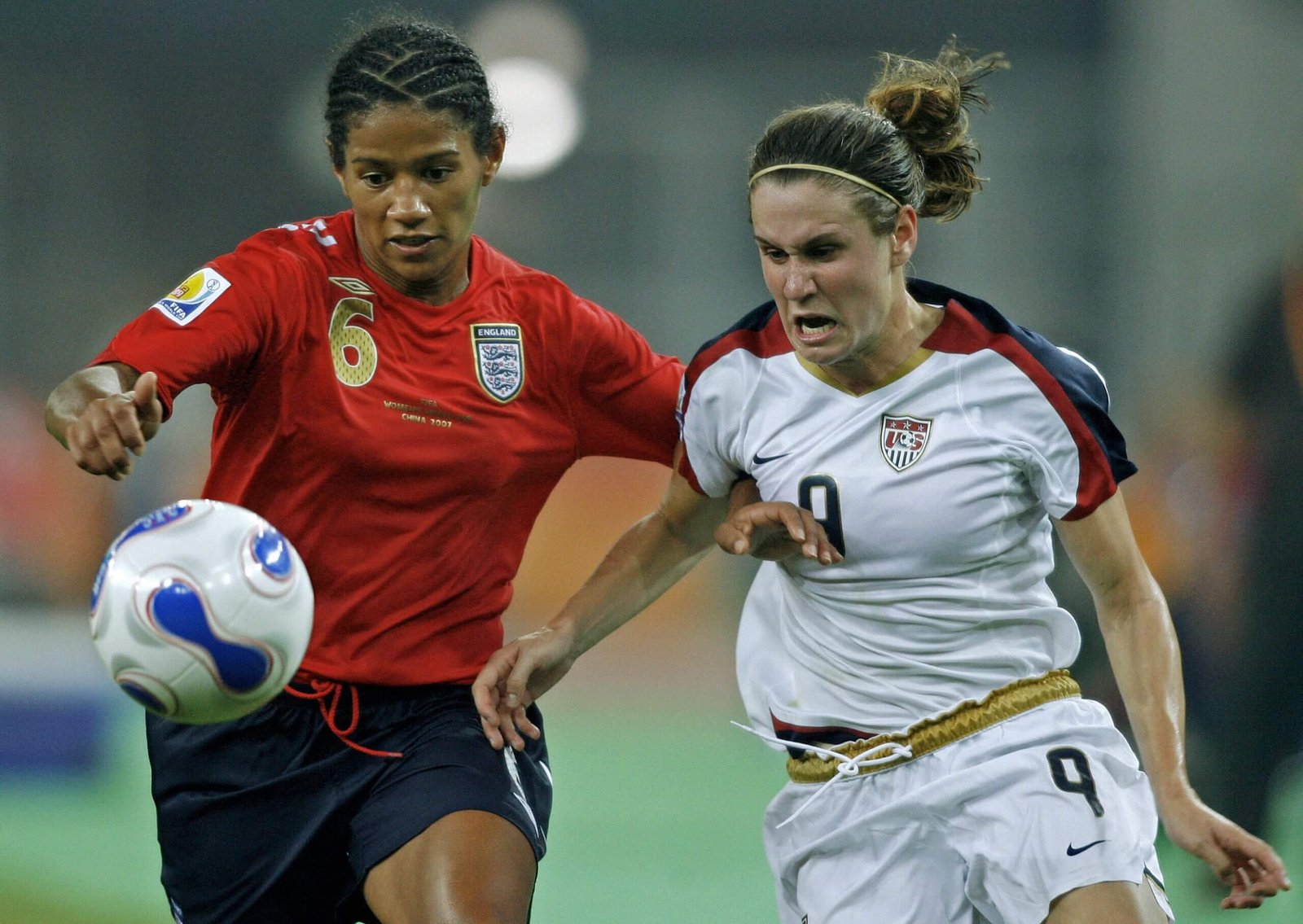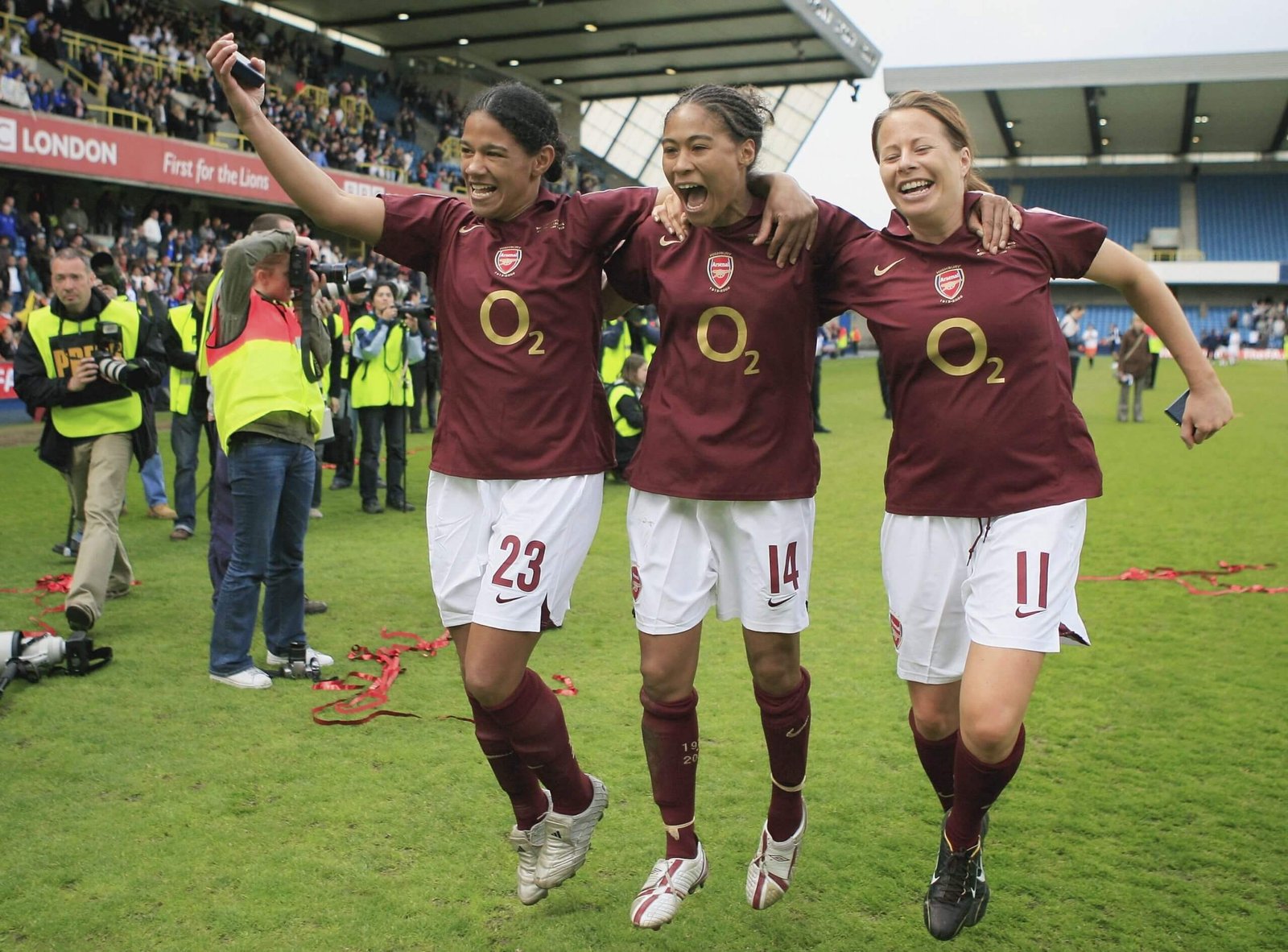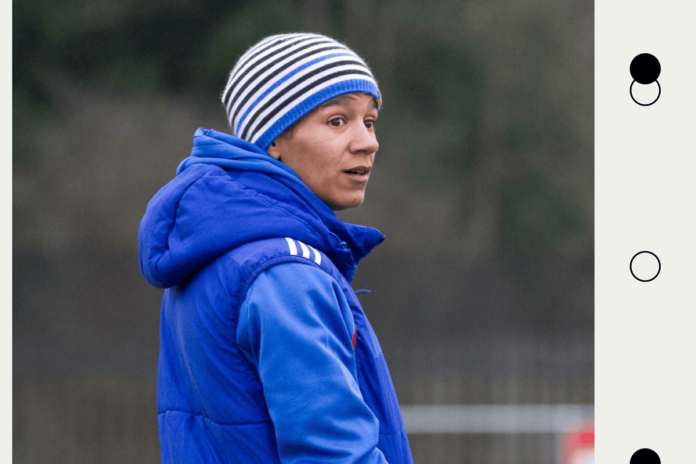This article is part of The Athletic’s series marking UK Black History Month. To view the whole collection, click here.
“You can’t do that.”
Mary Phillip can still hear the words.
They were shouted at the future England captain as she scrambled up trees after her older brothers in Peckham, south London. They were hurled in her direction when she played football in the street, or bowled a cricket ball, or simply ran until she could not run anymore.
The words were never far away. When they hit her ears, Phillip would spin on her heels and demand: ‘Why?’
“Because I couldn’t understand why,” Phillip, the former Millwall, Fulham, Arsenal and Chelsea midfielder, tells The Athletic. “I was never given a reason why, so I figured I would just carry on. That was the pattern I was in.”
For the next four decades, Phillip’s pattern became a way of life.
At 18 years old, she was called up to England’s 1995 World Cup squad. In 2002, she became England’s first female Black captain, wearing the armband after giving birth to her second child. A year later, she captained Fulham to a domestic treble before helping Vic Akers’ famous Arsenal side become the first (and only) English side to lift the UEFA Women’s Cup, now known as the Women’s Champions League, in 2007. By retirement the following year, Phillip had accumulated 65 England caps, seven FA Cups and five league titles.
The 47-year-old is now back where it began in south London as manager of Peckham Town, a men’s team who play in the Kent County League, step seven of the non-League pyramid (England’s 11th tier), and with whom she has volunteered since 2000. In 2020, she led hometown side Peckham to London Senior Trophy glory, becoming the first female coach to win silverware with a men’s senior side anywhere in the English pyramid.
That triumph arrived three years after Phillip was diagnosed with multiple sclerosis (MS), a chronic autoimmune disease which affects the central nervous system.
Phillip makes fascinating company.
She speaks about returning from giving birth to play for England (twice) as if discussing her lunch. The fact that she and Rio Ferdinand, the former West Ham, Leeds, Manchester United and England centre-back, emerged from Peckham to reach the zenith of their sport is “one of those things… just two people who have done stuff in their lives”. Her playing and management style hinges on the notion of “Don’t do the impossible”, which is patently ironic.
Phillip is not being insolent, indifferent or even modest. “I’m just your average person who enjoys sport, who enjoys family life and being herself,” she says. “Nothing more.”
Mary Phillip, left, holds aloft the Women’s FA Cup after winning it with Fulham in 2002-03 (Matthew Ashton/EMPICS via Getty Images)
Phillip’s ‘football journey’ started the day a dinner lady at her primary school demanded an all-girls team be established after Mary was shunned from the boys’ games. At 12 years old, she joined nearby Millwall Lionesses, where she and other future England nationals such as Hope Powell and Katie Chapman rose through the south-east London club’s pioneering Centre of Excellence.
“You couldn’t dream of something like that as a girl of my generation,” Phillip says. “Unless it was tennis or athletics, women didn’t have careers in sport. I never thought I would one day play for England, or for the best women’s team in the country, or be professional. Boys could, but not me.”
Where gender threatened to inhibit Phillip’s prospects, she says she never felt that race did. Phillip’s dad hailed from Saint Lucia in the Caribbean and worked as a bus driver while her mum was of Irish descent and was a school teacher. Nearly half of Peckham’s population (around 14,500) identify as Black, Black British, Caribbean or African, according to the UK’s 2021 Census, with a further 10 per cent identifying as Asian and Asian British.
“I wasn’t brought up to see colour,” Phillip says. “I was just brought up to see people as they were and to take people as they were. I can recall one time in school in an English class when I was 14. A teacher came up to me and said, ‘Are you Black or are you white?’. I didn’t answer her. If you look at me, I am a Black person. To ask me a question like that… I didn’t know where she was coming from. I will never forget that day, because the room went silent.”
While playing for Millwall, she caught the eye of then England Women’s manager Ted Copeland, who called the 18-year-old into his 1995 World Cup squad. England reached the knockout stages of what was their true major tournament debut before losing 3-0 to eventual runners-up Germany.
“I was so young. Looking at the players who were in front of me, I wanted to one day reach that level,” says Phillip, who won just six caps between 1995 and 1998. “I never wanted to be part of a squad going to competitions. I wanted to be in the team. That was my target I set at that World Cup.”
Unknown to Phillip, she was four months pregnant during that tournament in Sweden. She continued full club training until eight and a half months into her pregnancy. After giving birth, she returned to Millwall’s competitive fray by the season’s end. She applied the same method when she was pregnant with her second son two years later.
It was then that the words “you can’t do this” bounded towards her again, a four-year hiatus from international football starting in 1998 to raise her children leading some team-mates and opposition to brand her England career over. Phillip refused to acquiesce. In 2000, she joined Fulham, becoming one of the first 16 British women’s players to turn professional. Not only was she recalled to the national team in 2002 — a year later, she became the first Black female to earn the honour of captaining England.

Mary Phillip tussles with the USWNT’s Heather O’Reilly at the 2007 Women’s World Cup (Peter Parks/AFP via Getty Images)
Since the English Football Association (FA) lifted its ban on women’s football in the 1970s, only 24 Black women have played for England. Just three — Phillip, Alex Scott and Rachel Yankey — have captained the team. At the most recent Women’s World Cup last year, England had just two Black players, Lauren James and Jess Carter, in their squad of 23.
“The professional setup isn’t helping young Black girls coming through,” says Phillip. “If you’re a young Black player coming through and you don’t have the attributes to make it in the top flight straight away, you aren’t getting in. There isn’t a pathway for players to come through after that.”
A similar problem persists in coaching.
According to research published by the Black Footballers Partnership last year, 43 per cent of Premier League players and 34 per cent of English Football League (the three divisions below the top flight) players across the combined 92 clubs were Black in 2021. Only four per cent of the managers were Black.
That was an analysis of the men’s game. Black women comprise an even smaller percentage in women’s football: in England’s top two divisions (the Women’s Super League and Championship, a total of 23 clubs), there are currently no Black female managers.
“It’s one of those old things where it’s like ‘Spot the Black’,” Phillip says of earning her coaching badges. “You’ll get a few but once they’ve got their badges, it’s about what doors are open for them.
“When you look at football today, consider the hierarchy of coaches, managers, chairs; everyone throughout the club — it’s not proportionate to what you would like to think. I’m sure, in years to come, it won’t be a question. It will be the best person for the job, regardless of their race, colour, and creed. It’s something we can hope for — it’s long overdue.”
Having children as a player or manager also remains a complex taboo in women’s football, with worries over fitness, work-life balance and support systems leaving many consigned to the theory that the two are incompatible.
Chelsea Women manager Emma Hayes and Aston Villa Women counterpart Carla Ward left their clubs this summer to spend more time with their children. FIFA, football’s worldwide governing body, now mandates that clubs provide a minimum 14 weeks of maternity leave for all female players and managers, while non-biological mothers are also granted family leave. But Phillip, who raised her two boys as a player and is now raising two girls while managing, wants more to be done.
“There’s no secret formula (to being a mum in football),” says Phillip. “It’s a will to work, from all parties. I have my family’s support. Going through the pregnancy, to keep training and knowing that I could come back to the squad was really helpful because if you come away from it, you build barriers for yourself.
“Bryan (Hall, Peckham’s chairman) understands the importance of family. It was never a matter of coming to coach but I can’t have my kids here. Instead, they come to training and games. My kids are part of my life here.”

Phillip, pictured with Rachel Yankey (middle) and Rachel Stowell during her time at Arsenal, won 13 major honours as a player (Ian Walton/Getty Images)
Phillip always envisaged life as a coach. She has badges to do so in basketball, tennis and badminton, as well as football. But she never felt she had to coach women’s sport.
“When you’re coaching, gender doesn’t matter,” she says. “You’re not coaching anything different. You’re coaching football. When you teach kids in school, you aren’t teaching based on gender. I don’t see why, when it comes to sport, we feel we have to change the specifics. If a men’s team has a female coach, all she’s going to do is teach them football.”
Nevertheless, the sight of Phillip on Peckham’s touchline remains a rarity. There has never been a permanent female manager in the English professional game.
The appointment of Hannah Dingley as interim head coach of League Two (the fourth tier) side Forest Green Rovers in July last year, stepping up from their academy, ignited a media circus, with the Welshwoman’s credentials investigated on social media to the point of paralysis. Phillip finds such reactions bizarre.
“I’m just out there being a coach, doing what the club has asked me to do, which is to coach the team to the best of their ability,” she says.
“It shouldn’t be seen as impossible. We’re not trying to do something different or make something up. We’ve got the same training as our male counterparts. The people we’re coaching want to learn and play the strategies of football that we’re putting out there. We need more women’s coaches in the men’s game and more men’s coaches in the women’s game.”
As Phillip lifted the London Senior Trophy four years ago, friends and colleagues ensured her daughters understood the latest chapter of history Mum had blazed — not that they needed telling.“My youngest daughter plays football,” Phillip says. “One day, we might see her pulling on an Arsenal or an England shirt. You never know. But I never want to force my kids. I want them to choose what they want to do.”
Having the agency to make their own decisions falls in line with the Phillip playbook. The bouts of illness the former England international felt during her playing career and afterwards were finally diagnosed as MS in 2017.
“I was blown over, but it’s part of my life now,” she explains. “I’ve learned to roll with the punches. After being diagnosed, my main focus was getting back on my feet and finishing my A Licence (coaching course). I spent my life playing football without knowing what it was. Now it’s been given a name but I’m not going to let it stop me.”
Shortly after our interview ends, Phillip rings The Athletic back.
“You asked me who I was,” she says. “It made me think. I know who I am, what I have done, but how do I describe myself? It’s a good question. I’m a very much take-me-as-you-see-me person. I don’t try to be somebody I’m not, I don’t try to imitate people around me. I want to create my own vibe.
“Everything I’ve done in life is key in me but I always try to be me and do the best I can. I don’t give up on the first go.”
(Top photo: Duncan Hart)
Read the full article here


